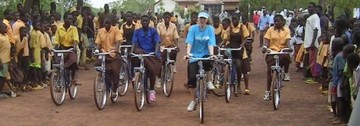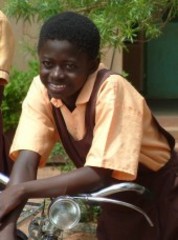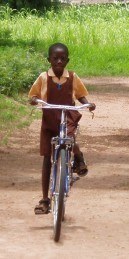Hayley's Bikes For Ghana
 Hayley races on
bikes, Ghana
Hayley races on
bikes, Ghana
|
(C)Dennis
McKinlay/UNICEFNZ
Buy a bike so a girl in Ghana can attend
school!
 Donate $40 now, buy a bike and help provide an education for a
Ghanian girl. $60 will buy a tricycle for a disabled child.
Donate $40 now, buy a bike and help provide an education for a
Ghanian girl. $60 will buy a tricycle for a disabled child.
In spite of
the Ghanian Government commitment to education for girls, there are still wide
gender and geographical disparities in education in terms of access, quality and
achievements. At primary school level, research shows that 22% of girls are not
attending school and at the junior school level 40% of girls are not accessing
school. In the northern districts of Ghana, girls exclusion is as high as 40% in
the primary sector and 67% at junior school.
To donate online, click here or post
your donation to UNICEF NZ, PO Box 10-978, Wellington and mark it for Ghana
Education Project.
Reasons for
Disparities:
-
Unavailability of schools within easy reach of pupils - UNICEF mapping
reports show many girls have to walk as much as 5 kms to school in all kinds
of weather.
-
A mismatch between school time-tables and girls' household duties - girls
have home duties to complete that boys don't have before they can leave for
school which makes them get to school late, tired and unable to concentrate.
Consequently many girls cannot cope and drop out.
-
Parental inability to cater to girls needs, free them from chores and
encourage school attendance.
-
Risks of accidents and sexual abuses for girls who walk, meaning their
parents become reluctant to send them to school.
-
Poor quality education and costs a strain on families.
What UNICEF and the Government are doing:
-
Provision of bicycles to help girls commute the long distances
-
Provision of tricycles to help disabled children
-
Scholarships to help needy girls
-
Provision of food subsidies and rations
-
Mobilising community support for girls education
-
Construction of water and sanitation facilities
-
Incentives to female teachers serving in rural and deprived areas
Since 2001, UNICEF has supplied over 5,000 bicycles and a study has shown
that as a result school enrolment is up, attendance levels are higher, academic
performance is better and drop out rates have reduced.
Another 5,000
bicycles and 1,000 tricycles (for disabled children) are needed urgently to
accelerate girls participation in education.
These bikes and tricycles
will be supplied to 6,000 girls in upper primary and junior secondary schools in
the 40 most deprived districts where girls exclusion is as high as
67%.
UNICEF NZ and Hayley are working together to help these girls get to
school and gain better life opportunities. Join us in making a difference for
girls education in Ghana by supporting this project to get girls into school and
keep them there. When you donate, you will become part of our mailing list and
receive regular updates on the numbers of able and disabled children we are
helping with their schooling.
 Project Update
Project Update
The impact of UNICEF's
bicycle project has a good precedent:
-
More than 95 percent of the beneficiary girls make higher daily school
attendance
-
The majority of the beneficiary girls (70%) acheive higher academic
performance than before;
-
Bicycles reduce the burden of household duties, enabling some students to
study even at home.
-
Parents are encouraged to send their daughters to school due to more
available time for children to help with household duties and their higher
academic performanc
An excerpt
from a letter by Rukaya who has received a bike:
"...(Before,) I found life very unbearable
as I always got to school very late. Attempt by me to satisfy either
my parent or my school authorities yielded as it was always impossible on
my part...(However now with the bicycle) Yes, I am able to get up
early, discharge my house duties in the morning and report to school very
early. I also get home very early from school and discharge my house
duties without any problem and do my home assignment. This is
because I no longer walk and become tired."
|

Hayley
Westenra, UNICEF NZ National Ambassador
(C)UNICEF
Related Links
Hayley Westenra
Strong
Woman Campaign